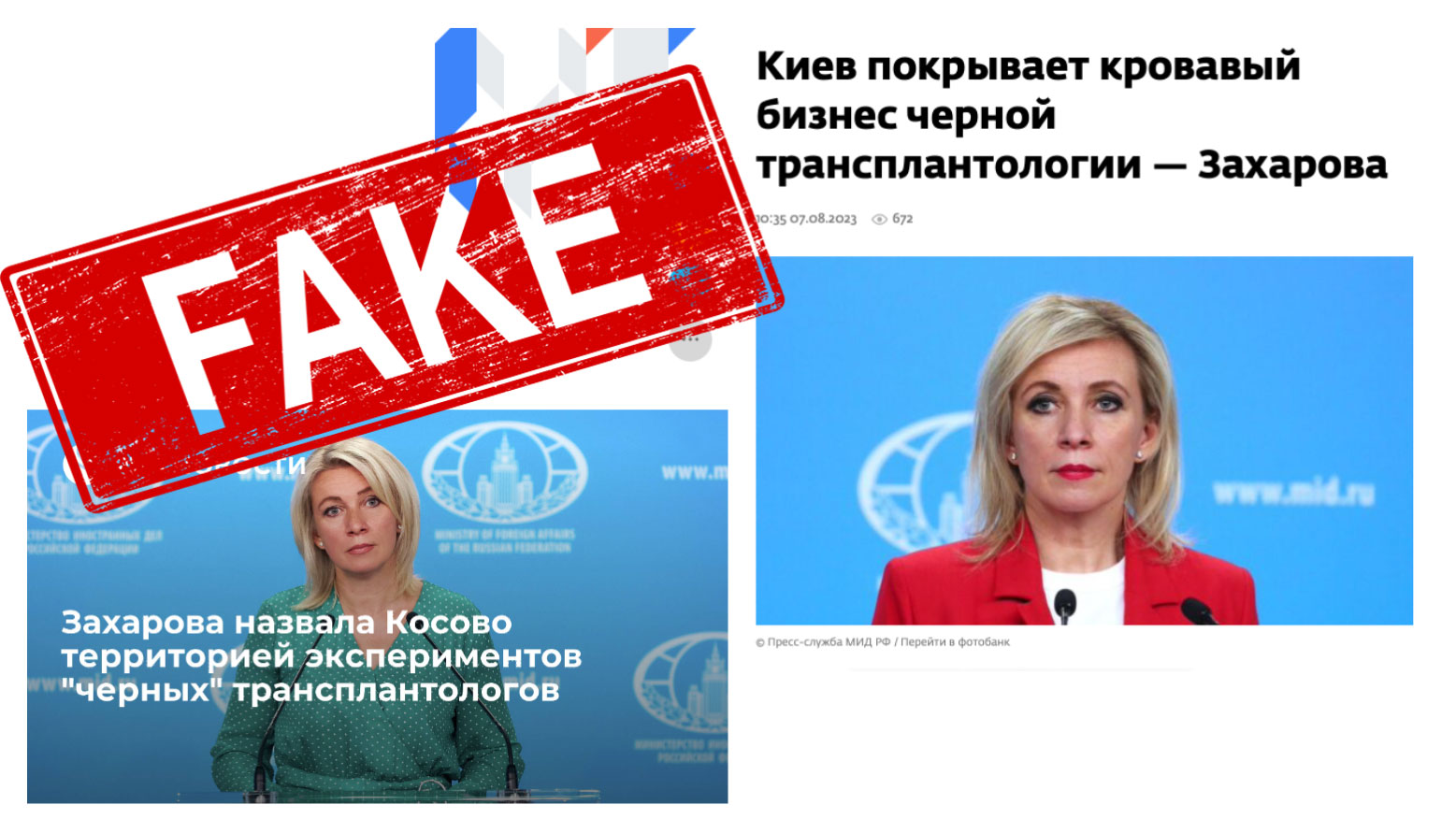One of the Kremlin’s top propagandists on the international stage, the press secretary for the Ministry of Foreign Affairs, Maria Zakharova, is once again circulating misinformation around the world. After she spread fake news on the so-called biolabs and “dirty” bombs in Ukraine, which found no confirmation, as well as a mad story of “war mosquitoes” allegedly deployed by the Ukrainian side, which was simply ridiculous, Maria Zakharova is now spreading nonsense about the alleged sale of organs of Ukrainian men and women.
The primary source of this claim is an article authored by MFA Russia’s press secretary, which alleges a massive scheme of a black market where Europeans can buy organs from Ukrainian donors. Perhaps Russia decided to balance the lack of evidence base in the piece with a high position of the rapporteur. Referring to this article, pro-Russian Balkan media, including RT Balkans, accused Kyiv of encouraging “black” transplantology.
The article notes the situation in Kosovo, where the illegal sale of human organs was allegedly observed in 1999. That high-profile case, however, never resulted in criminal prosecutions and court verdicts. The reports of some “yellow house” in the north of Albania, where illegal transplantation operations allegedly took place, were never confirmed by the inquiry. No witnesses were ever found so the trial ended in nothing. Back then, the Russian side actively fabricated facts to justify the arbitrary deployment of their military contingent of peacekeepers to Kosovo without a responsible institutions decision.
The “black transplantology” topic was one of the central lines of Russian propaganda during the second Russian-Chechen war, so it can rightly be called traditional.
Now, Russia’s latest fake story emerged against the background of an appeal by 56 respected 56 European lawmakers (including two Ukrainian MPs) and American legislators, who demanded that Brussels, Washington, and London change their policy towards Belgrade. The appeal noted a significant shift in European policy in favor of Serbia with disregard to the interests of Pristina. The immediate reaction on the part of the Russian Foreign Ministry was to resuscitate the old fake about the crimes of Albanians, now in the context of Ukraine.
The ultimate goal of spreading disinformation is to try to compromise Ukraine, to confuse Europeans about the need for further armed support to Ukraine, and to try to change the position regarding the evaluation of the EU’s cooperation with Belgrade and Pristina, demanding more support for the latter.
It is noteworthy that some of the Balkan media in the context of MFA Russia’s statement identify Turkey the end point of the “organ sales route”, claiming that “it’s not the first time” that Ankara is seen participating in organ trafficking.” At the same time, in her article, Zakharova did not dare to directly accuse Turkey, simply claiming that “one of the NATO allies” is part of the scheme.
In the previous fake story about Kosovo, Turkey was mentioned in the context of the alleged involvement of a Turkish surgeon in conducting illegal organ transplant operations and setting up a human trafficking channel with Prishtina for the purpose of doing such operations. At that time, Ankara fully supported Tirana and Pristina politically, so that support had to be somehow discredited. And now that Turkey has taken certain anti-Kremlin steps, calling on Russia to unblock the Black Sea Grain Initiative, suddenly, of the grain terminals near Istanbul caught fire while Moscow indirectly accused Ankara of supporting Kosovo and Ukraine, once again revisiting a good old fake narrative.
Last year, Andrey Marochko, the police chief in the so-called “Luhansk People’s Republic” joined Zakharova’s fabricated accusations. While holding in dungeons thousands of people who protested the occupation of Luhansk region by the Russians, he also tried to accuse the Ukrainian military of allegedly trading in the human organs of soldiers wounded and killed in action. Again, there’s been no confirmation of that report, whose sources were far from credible.
The accusations voiced by Maria Zakharova, like those put forward by other Moscow officials, should be perceived as a purposeful psyop that pursues a certain political goal. With the outset of a full-scale war against Ukraine, the Ministry of Foreign Affairs of the Russian Federation has turned into a main actor engaged in spreading Kremlin propaganda, which misleads its own citizens and tries to influence international public opinion.


